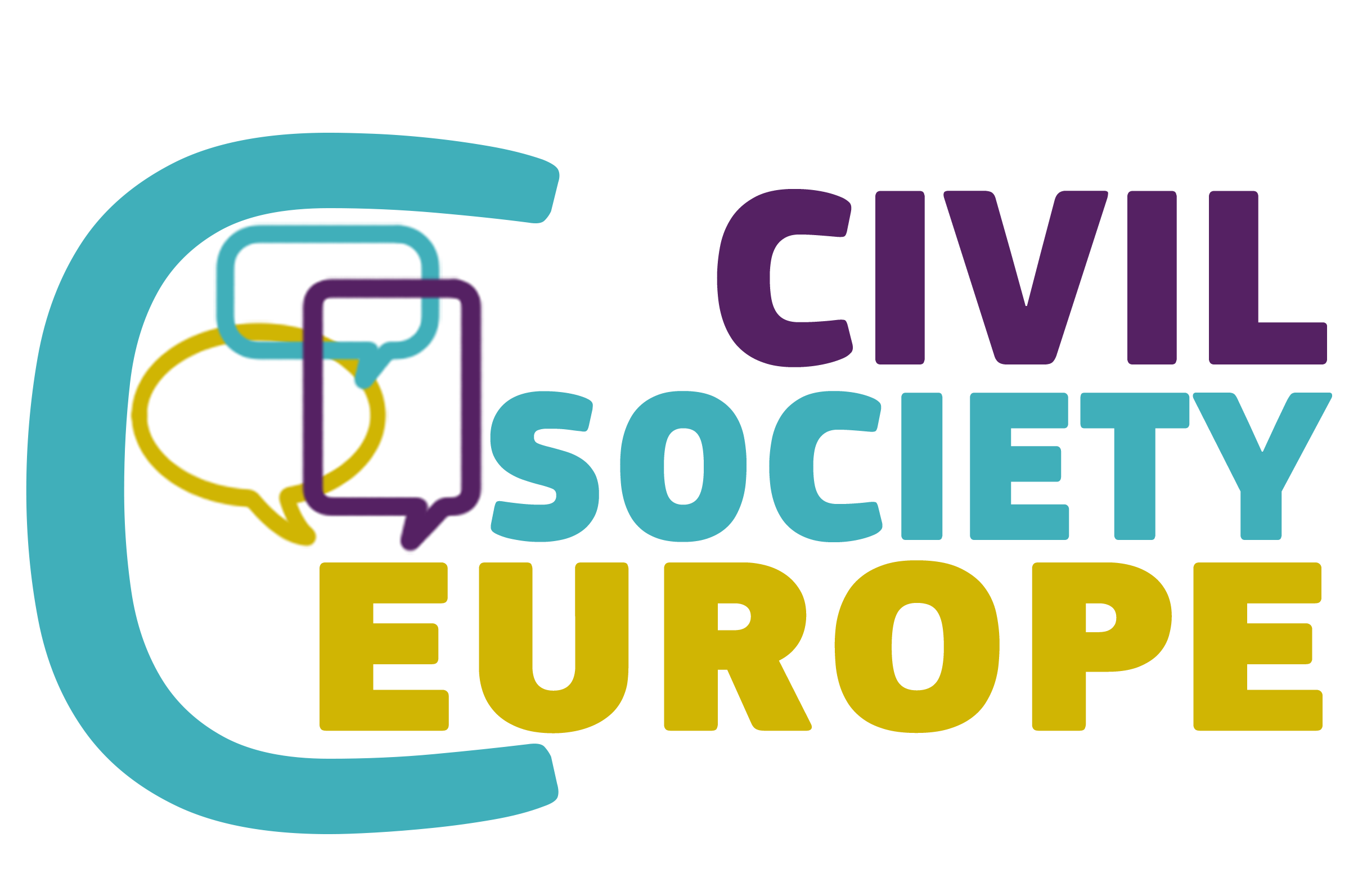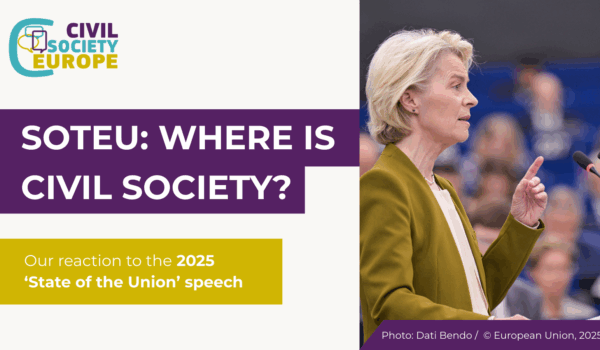Civil Society Europe’s Reaction to the State of the European Union (SOTEU) speech
On the 10th September 2025, the President of the European Commission Ursula von der Leyen delivered the annual State of the European Union (SOTEU) speech, which launches the EU political year and indicates the priorities for 2026. In view of this important political event, Civil Society Europe, together with more than 35 civil society organisations, drafted the Civil Society State of the Union, presenting key civil society proposals for the EU’s 2026 policy agenda across six thematic areas: democracy and fundamental rights, migration and mobility, social EU, climate transition, digital transformation and human centred security.
On democracy, we support the commitment to strengthen the annual rule of law cycle, as well as the measures to implement Rule of Law conditionality within the next Multiannual Financial Framework, the EU’s long-term budget. We welcome the announcement of a European Centre for Democratic Resilience and of a Media Resilience Programme to support independent journalism and media literacy. However, more needs to be done to strengthen the resilience of democratic and fundamental rights at EU and national level: we propose the creation of a European Electoral Authority, a strengthening of the mandate and means of the Fundamental Rights Agency, and the creation of a scheme to support Human Rights Defenders within the EU. We call for a new pact for transparency within the EU institutions, and an inter-institutional agreement on civil dialogue to systematically involve civil society in EU policies, finally implementing article 11 of the Treaty on European Union.
On the EU in the world, we welcome the EU’s willingness to do more on the international stage, strengthening its support to Ukraine and taking a stand in supporting Palestine.
On freedom of movement and migration, we condemn the securitarian and repressive tone of the SOTEU speech, centred only on the Returns Directive, and the protection of borders. We support a shift of paradigm from returns, deportations and detention to regular pathways on a variety of grounds, and promote decent work and full civic and social inclusion. The implementation of the Pact must be carried out in full compliance with EU and international law, particularly the Charter of Fundamental Rights and must take into account the jurisprudence of the Court of Justice of the European Union and the European Court of Human Rights. That is why we propose a reform of Frontex on a right-based mandate, to work with civil society to ensure transparency, monitoring, and the primacy of fundamental rights in all return and border management operations. We also regret the lack of mentions of the de facto suspension of internal freedom of movement within the EU due to the regular reintroduction of border controls by several Member States. Freedom of movement across internal borders must be fully and immediately restored to preserve the integrity and benefits of a borderless Europe, as well as preventing discriminatory and illegal practices of ethnic and racial profiling, which undermines the right to non-discrimination and stands at odds with the European Commission’s commitments under the Anti-Racism Action Plan.
On social policies, we support the proposal of an ambitious anti-poverty strategy to eradicate poverty by 2050, paired with the proposal of a quality jobs directive and of an ambitious housing plan, including a revision of the state aid rules. This, however, needs investments: the disappearance of a standalone European Social Fund in the next MFF and the size of social investments for the period 2028-2034 clearly do not meet the ambitions of such a proposal. Furthermore, we propose to revise the public procurement directive to ensure that public funds create decent jobs and support the climate transition, and we must work towards a traineeships directive that bans unpaid traineeships. While the Global Health Resilience Initiative is a welcomed proposal, we must deliver on a real European Health Union, including on providing better working conditions and addressing shortages in the health and care workforce. Inclusion and equal access to knowledge must be at the core of EU policies: we propose to deliver a real Union of Equality, a Union of Skills that delivers on lifelong learning competences, and a European plan for establishing Community Lifelong Learning Centers.
On environment and climate, little to nothing was said on how to tackle the climate crisis and deliver on our climate targets. The proposed investments in circular economy and clean industry, grid and tech are welcomed. However, in order to be truly clean, regulations must be in place: the omnibus packages , as well as the promised investments in U.S. fossil fuels in exchange for a reduction of tariffs against the EU, risk undermining the EU’s social and environmental standards. This, along with the disappearance of the LIFE programme from the next MFF, puts into question EU funding for environment and biodiversity. EU internal and external policies need to be up to our climate targets: that is why we call on the EU to develop a ‘no-pollution fence’ for products entering the EU Single Market, to revise the animal welfare legislation, and to tackle the marketing of unhealthy food products, especially towards children.
On digital transformation, we welcome the commitment to the development of AI and tech, ensuring the EU doesn’t lag behind. However, we underline how Europe cannot develop the same sort of oligarchic structures of US digital, tech and social media platforms. EU digital sovereignty must be based on European values: this means promoting free software, open and interoperable European-developed digital technologies that respect our environment and human rights. European-developed digital technologies should also ensure ethical development and deployment of new solutions, guaranteeing high standards of fairness, transparency, explainability, safety, and security of technology, as well as data privacy standards. Furthermore, we propose a Directive on the application of AI in the workplace, to define a clear taxonomy of jobs at risk of automation. We call for the creation of publicly funded upskilling and job-transition programmes, support pilot projects in human-centric AI, co-designed with workers in the affected sectors, to ensure technologies meet actual needs and reinforce social value, and support the ex-ante assessment of algorithmic fairness and AI ethics standards in terms of transparency, explainability, safety, and security.
On defence and resilience, we commend the reference to the work of the EU Civil Protection Mechanism this summer, and the announcement of the creation of a European Firefighting Hub in Cyprus. We underline how defence and resilience cannot be considered in military terms only, but should entail a broader strategy of material and societal resilience, for which the role of civil society is crucial. This means considering policies like healthcare, energy, food safety, water resilience, and inclusive social and educational policies as important for the EU’s defence as weapons’ joint procurement. In a world where international rules are broken, crimes against humanity are everyday news, and authoritarianism spreads, the EU must be an actor for peace, democracy and fundamental freedoms across the globe.
Finally, we regret a lack of mention of the Civil Society Strategy, as well as of the work that civil society organisations do every day to support our communities, and to be a watchdog for those in power. At a time where civic space is shrinking at European and national levels, where attacks against NGOs are being reiterated in the European Parliament by right-wing forces (including during this debate), a strong commitment to promote and support civic space and civil society must be at the core of the 2026 political year, from the Civil Society Strategy to the Democracy Shield, to the negotiations for the next Multiannual Financial Framework, and beyond.
Civil society is ready to do its part in shaping next year’s political cycle. As highlighted in the Civil Society State of the Union: “we know the struggles of people who live in Europe firsthand, and can provide this perspective.”


